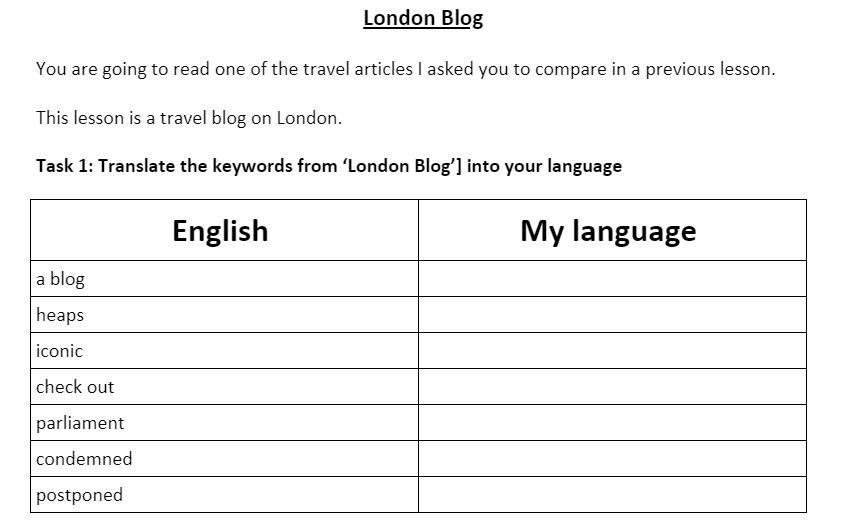In today’s covid-19 guidance, Jon Bifield, EAL Lead at a secondary school in Leicester, describes some of the ways he is helping to support his students during school closures. Jon is a prolific blogger on EAL, and a wealth of information. Do check out his blog (where this post was reblogged from) for more excellent content. https://ealdaylight.com/
This post does not have a magic wand that will solve everyone’s problems in how we can support our EAL learners. However, I hope by sharing what I am doing to support my EAL learners, you might get some ideas of how you can also support your EAL learners.
The Context
I am going to talk about a group of learners I am supporting who are in Y10 (UK system). There are 10 learners in the class, with a range of languages, and a range of proficiencies in English. They have specific lessons from me in which I try to support them in developing their English language skills in relation to content they study in the mainstream. For example, we investigate different genres of writing and I base lessons around the genre and some area of content / subject that my learners are studying. The hope is that they can then use the language they have learned in their mainstream lessons.
What are they learning with me at the moment?
Prior to lockdown, I had started a unit of work with them on the genre of travel writing. In some ways the genre of travel writing might be something they encounter in GCSE English language because they might read a travel writing article or they might have to write as if they are a travel writer. Also, I chose the genre of travel writing because I love travelling, my learners love talking about their countries and they also love grilling me about a country I lived in, Thailand!
Before lockdown I had only introduced them to the ideas of travel writing, what it is, what it might look like, what are the purposes of travel writing and I highlighted some of the language features we would learn about in this unit of work.
What am I doing now during lockdown lessons?
It’s very hard! Some learners do not have access to internet, IT and have limited English language skills. To get around this I make sure they understand that they don’t have to do the work I set on a device, they can take a photo of the work they complete and send those to me (most learners have a mobile phone of some sort!). Furthermore, with the issue with internet, this makes it very difficult for learners to receive work. There is no perfect solution to this. Most of my learners do have access to the internet even if it is through mobile roaming rather than a specific internet service within the house.
Below is an example of a lesson I set for the class. Most of the learners have completed the work. Myself and their Head of Year are chasing those that haven’t! I am also keeping a record of online learning using a spreadsheet which I email out to the learners to show them who has completed what! A bit of peer pressure never hurt! (maybe!)
This lesson involved them reading a travel blog on London.
- Make instructions as clear as possible

2. With a reading task, I think it is good to do some vocabulary work. To support this I get learners to translate words into their first language. You can also recommend specific websites to do this in such as Google Translate.
2. Learners scanned the text and highlight or find the keywords they have translated in the text. They then read the text.
3. Answer some comprehension questions (see below). These can be differentiated to the proficiency level of your learners. I did include some visuals as you can see.

4. Using the keyword list, I then asked them to write sentences or a paragraph about their own country or city (use background knowledge) using the keywords in the style of a blog. They could write these sentences first in their first language or they could write them in English. Most chose to write in English.
After they finished, they then emailed the work to me either using the Word Doc I sent out or by taking a photo of the work they have completed on paper.
Observations / thoughts
Most of my learners were able to complete most of the tasks. Some find certain tasks harder than others. For example, the question on why the writer has used the term ‘huge monopoly’ was quite tricky but I actually got some really good responses to this question.
Most didn’t read my questions properly and I asked them to complete the work they had not finished which they have done.
The writing of the sentences / paragraphs proved useful as most were able to do this. Of course there were errors but exposure to new vocabulary and practising writing is really important for them.
I have done similar lessons and they seem to work. The next thing though is how can I vary my approach because you don’y want to do the same thing all the time!
There is no perfect solution to this for our EAL learners but I hope this might give you some ideas.
Please share your ideas in the comment section. Wouldn’t it be great for those of us working with EAL learners could share our ideas together?
Take care everyone and stay safe!

